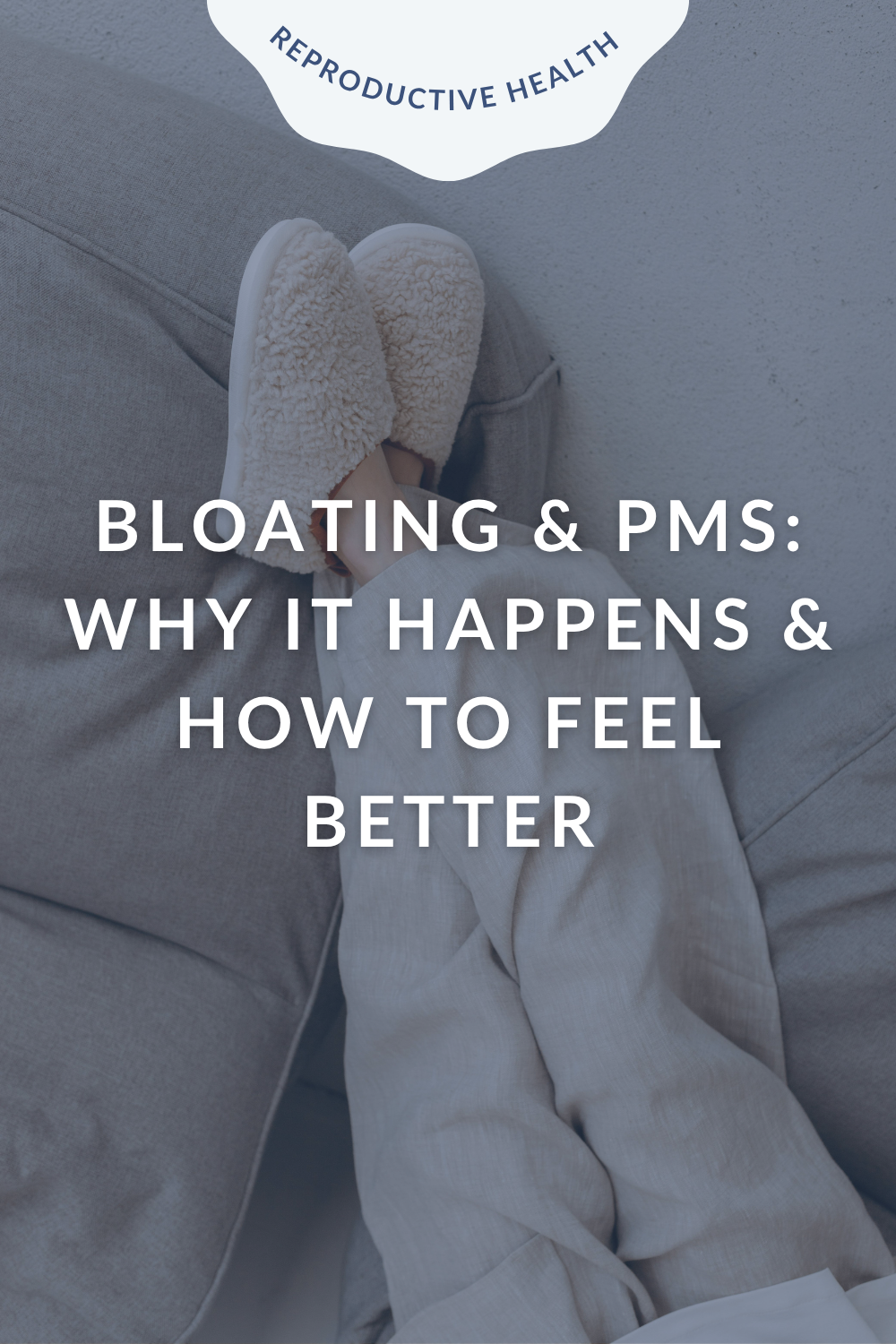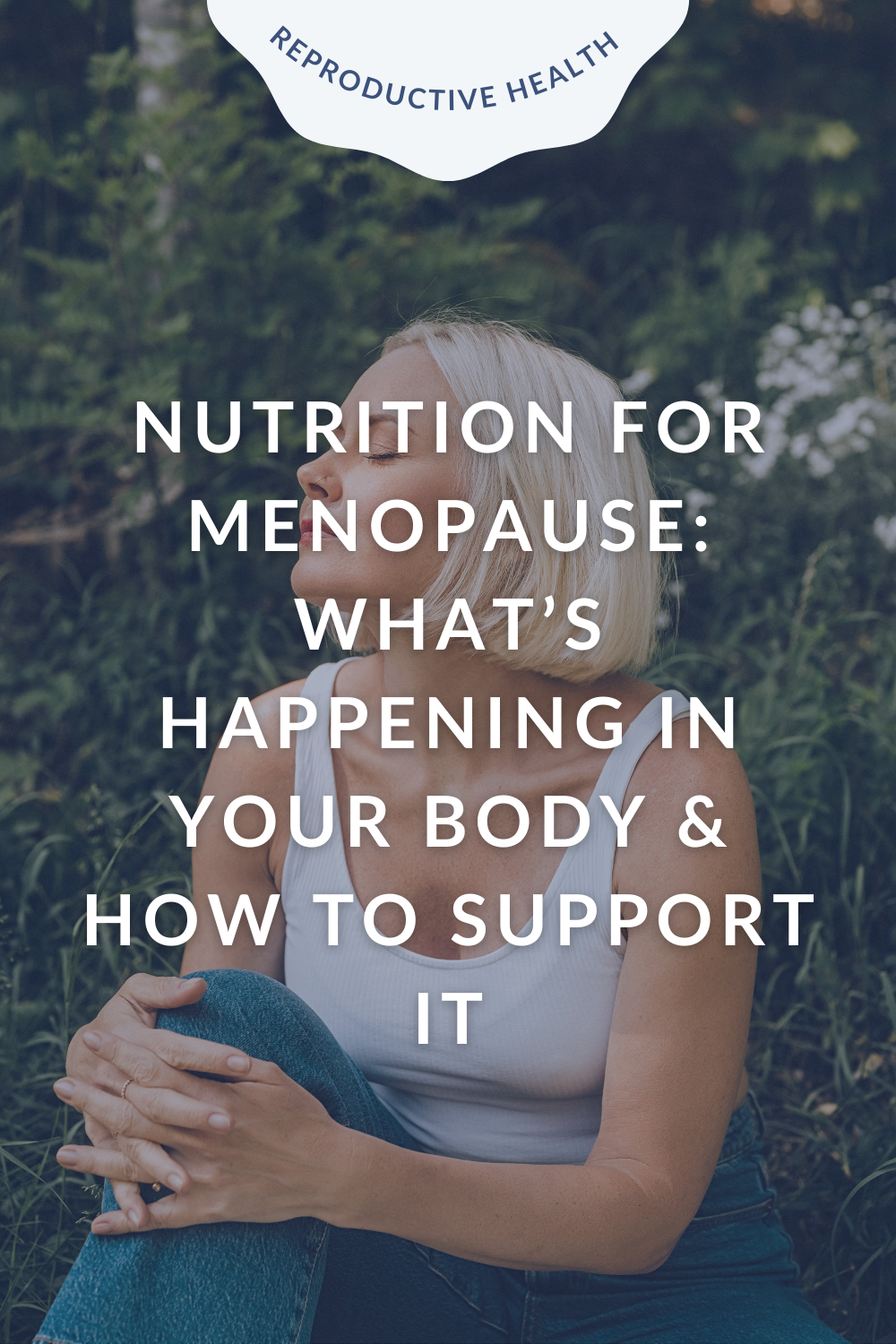Bloating & PMS: Why It Happens & How to Feel Better
If you’ve ever heard, “Everything looks normal,” while your waistband begs to differ, you’re not alone. Bloating is one of the most frequent concerns my clients and PCOS Recovery Program members raise, often with a mix of confusion (“I didn’t even eat that much!”) and frustration (“Why does it hit harder right before my period?”).
Today we’ll unpack what bloating actually is, why it can flare during certain phases of the menstrual cycle, and the evidence‑backed (but totally practical) steps you can start using tonight.
What is Bloating?
Let’s get something straight: bloating is not the same as fullness AND some bloating is normal. You should feel full after a meal, and even have your abdomen expand; that’s a normal part of digestion.
But many of us have been conditioned to fear that sensation, or to believe it means something is wrong if we don’t have a flat stomach. (So, if your jeans feel tighter after eating… that might just mean you ate. That’s okay. That’s human).
What we’re talking about today is different: Bloating in the clinical sense is a tight, full or swollen feeling in the abdomen, sometimes accompanied by visible distension, pressure, or gas. This is disruptive towards your day, and you might describe it as “a balloon-like fullness,” a “heavy, sluggish gut” or a “belly that feels harder than usual.” Maybe it even comes with some cramping, pain and bowel irregularity.
If bloating happens regularly or severely, it’s worth investigating. We often see it in clients with functional GI conditions like Irritable Bowel Syndrome, dyspepsia, functional constipation, or more.
When bloating becomes frequent or severe, it’s worth digging deeper. Even in the absence of structural disease (think Crohn’s, celiac, SIBO), functional bloating can occur and is incredibly common in conditions like IBS, functional constipation, or dyspepsia.
Why You “Randomly” Get Bloated
Let’s start with this: even when everything looks “normal” on paper (meaning no underlying conditions like Crohn’s, colitis, celiac disease, or SIBO) - functional bloating can still happen. And it’s incredibly common.
What’s tricky is that bloating can really fluctuate in intensity. It might start off subtle but gradually build - and for many people, it’s at its worst after meals and at the end of the day.
And if you get your period each month, you might’ve noticed it doesn’t feel the same every week. During the luteal phase of your cycle, where progesterone and estrogen both rise and then fall before your period begins, you may feel more bloated than usual, and this can occur into the days of your period.
One thing I often hear is that some clients will become more reactive to foods they normally tolerate just fine. That’s because hormone fluctuations can influence how your digestive system responds, even without changes in your diet.
Functional bloating can be influenced by:
Eating behaviours and meal hygiene (pace, timing, volume)
Gut brain connection like - Visceral hypersensitivity, hypervigilance constant fight-or-flight response
Food-related factors (fermentable carbs, high fat foods, spicy, unique intolerances/sensitivities)
Motility and gut function (slowed transit time, delayed gastric emptying, pelvic floor dysfunction, post-infection IBS)
Lifestyle (sleep, changes in routine, travel)
And more
And if you’re thinking, “Okay, so it could be everything?” - not to fret! It likely isn’t all, but some. Everyone has a unique threshold where they can tolerate variability in any of the above factors - the key is to learn what yours is.
If this sounds familiar, I want to remind you that we have a free resource to help you get started on finding relief: the Hormone + Gut Health Toolkit. This toolkit gives you simple, sustainable actions that ease digestive and hormonal discomfort. Start your journey to feeling lighter, calmer, and more in control today.
Why Is Bloating Worse Before Your Period?
You might have noticed that your bloating doesn’t feel the same all month long. Maybe mid-cycle you feel pretty good, but then, like clockwork, that tight, puffy, gassy feeling creeps in during the luteal or menstrual phase. Sound familiar?
It’s well known that IBS is significantly more common in women. One explanation is that women may be more likely to seek healthcare. But there’s also a strong hypothesis that hormone fluctuations throughout the menstrual cycle directly affect how the digestive system behaves. a A study of over 100 women with IBS found that over 50% of them experienced constipation during their luteal phase (common cause of bloating).
Let’s take a closer look at what happens hormonally during the luteal and menstrual phase. After ovulation, progesterone levels begin to rise. If pregnancy doesn’t occur, progesterone and estrogen both drop right before your period begins.
Your basal metabolic rate increases
Your appetite might shift
There can be an increase in local inflammation due to the thickening (and eventual shedding if pregnancy does not occur) of the uterine lining
For many people, this is when PMS symptoms peak, and things like mood changes, cravings, bowel irregularities and yes, bloating.
Furthermore, hormone changes may increase something called visceral hypersensitivity, which is the heightened sensitivity of your gut to normal sensations like gas or pressure.
There’s also the phenomenon of hypervigilance. This is just a fancy way of saying you’re paying closer attention to what’s happening in your gut. This heightened awareness can turn up the volume on your digestion, making sensations feel even more intense.
All of these factors can create the perfect storm for more bloating and abdominal discomfort.
What Can You Do To Reduce Bloating?
All that’s to say, if your digestive tract is already sensitive, hormone changes might make it a little more reactive, which is why tracking your symptoms and becoming aware of these patterns can be really empowering. It’s not about restriction, it’s about rhythm.
These natural ups and downs are part of living in a body that cycles. The more we understand them, the more we can respond with care instead of frustration.
So, what can you actually do when bloating worsens around your period?
The good news is that you don’t need a completely different strategy. The foundational gut health principles still apply, but during your luteal phase or period, you might need to include more targeted interventions to match the heightened severity of symptoms.
Start with food and symptom tracking. I know, tracking can feel tedious. But this is how you learn your unique patterns.
You might discover it’s not a single food causing your bloating, but rather a buildup - like too much roughage from raw vegetables, or several high-FODMAP foods layered together in one day.
Other common culprits include: poor meal hygiene, sugar-free gums or mints, carbonated drinks, sedentary behaviours, spicy foods, high fat meals, large volumes, skipping meals.
Download the Free PCOS + Gut Health Symptom Tracker to get started!
Manage constipation if it’s part of the problem. Constipation can cause or worsen bloating by backing up gas and stool. Supporting regular bowel movements is key.
Practice meal hygiene. Focus on pacing, timing and portion size to help your digestion work smoothly.
Up the fibre (slowly and strategically). Gradually upping your fibre intake while staying well hydrated can reduce bloating and support gut health.
Don’t forget movement, stress management and sleep. Physical activity encourages digestion, while stress reduction and good sleep help regulate your gut-brain connection and reduce bloating.
And finally, bring your findings to a nutrition professional. Our team of Registered Dietitians can help you identify specific triggers or the cumulative buildup of factors, find suitable food substitutions and develop sustainable, personalized strategies to find relief from gut and hormonal discomfort.
Bloating can be frustrating, but understanding your body and tracking symptoms can help you find relief. With simple, practical steps and support, you can feel lighter and more in control, especially around your cycle.
You’re not alone, and better days are ahead!
References:
Iovino P, Bucci C, Tremolaterra F, Santonicola A, Chiarioni G. Bloating and functional gastro-intestinal disorders: where are we and where are we going? World J Gastroenterol. 2014 Oct 21;20(39):14407-19. doi: 10.3748/wjg.v20.i39.14407. PMID: 25339827; PMCID: PMC4202369.
Judkins TC, Dennis-Wall JC, Sims SM, Colee J, Langkamp-Henken B. Stool frequency and form and gastrointestinal symptoms differ by day of the menstrual cycle in healthy adult women taking oral contraceptives: a prospective observational study. BMC Womens Health. 2020 Jun 29;20(1):136. doi: 10.1186/s12905-020-01000-x. PMID: 32600463; PMCID: PMC7325082.
Mendelson S, Anbukkarasu P, Cassisi JE, Zaman W. Gastrointestinal functioning and menstrual cycle phase in emerging young adult women: a cross-sectional study. BMC Gastroenterol. 2023 Nov 21;23(1):406. doi: 10.1186/s12876-023-03036-3. PMID: 37990300; PMCID: PMC10664285
Pati GK, Kar C, Narayan J, Uthansingh K, Behera M, Sahu MK, Mishra D, Singh A. Irritable Bowel Syndrome and the Menstrual Cycle. Cureus. 2021 Jan 14;13(1):e12692. doi: 10.7759/cureus.12692. PMID: 33614302; PMCID: PMC7883586.
Hi! I’m Trista
A Registered Dietitian and reproductive health expert. I’m here to help you gain confidence to overcome your Polycystic Ovary Syndrome and digestive health woes, while bettering your relationship with food.
CATEGORIES
Ready to build lasting habits?
For personalized support and lasting change, explore our 1-on-1 dietitian coaching programs, designed to help you reduce bloating, improve your periods and feel your best! No more second-guessing. Just clarity, relief and wellbeing.
Book your free 15-minute intake call today.













